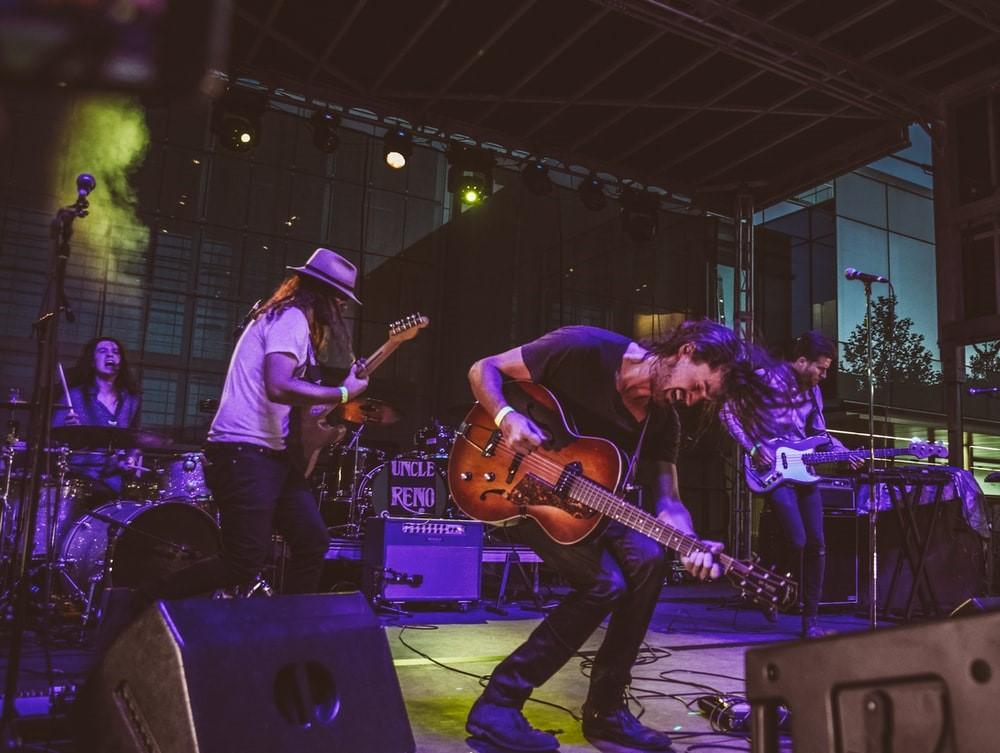If you are considering learning to play guitar, ask yourself what you want to achieve as a guitarist.
What motivates you to learn how to play the guitar? What song(s) would you like to be able to play? Which musician do you aspire to be?
What music genre gives you pleasure? Do you want to learn songs off the top of your head, or do you want to compose your own? Do you wish to play solo or be a part of a band?
There are no restrictions here.
Make a list of your favorite songs, guitar players, songwriters, guitar methods and talents, riffs, solos, and dream objectives.
Then, be precise and select one or two goals to work on. Once you've written everything down, limit it to the three most outstanding purposes you want to accomplish.
Now, for every objective, divide it into smaller portions. Make a list of the tiny measures you can take daily to get closer to fulfilling your aims.
What exactly do you need to practice? What talents do you need to work on, develop, and improve? What and who do you need to get to the next level?
Take it one day at a time. Make a list of everything and take one tiny action per day. Every day enables you to connect to your objective.


What Do I Need To Know Before Learning How To Become A Rock Guitarist
Do you want to be the greatest guitarist of all time?
You can be, so do not put yourself down by not having faith in yourself. For that, it would be best if you concentrated on your journey, not on the path of others.
While this may appear self-evident, it isn't for many people.
Many guitarists tend to compare themselves to other performers and follow their journey rather than their own. The truth is that we are all meant to be different types of guitarists.
Your thoughts, taste, anatomy, emotions, and day-to-day living are all distinct. These factors influence how you play, what you play, and the musical direction you will take.
You will only be successful if you do this.
Second, you must cease making excuses! Please stop trying to convince yourself or others that you can't do it, that you don't have time, that you're not quick enough, or that you'll never be a pro.
You are one-of-a-kind, and if you remove all that nonsense, you can become the finest guitarist you can be.
And the third factor that plays a vital role is your instructor. Are you learning from a YouTube tutorial, or are you searching for guitar classes near me on a search engine?
Superprof has professional guitarists available to teach you. Many even offer free demo classes! Starting at the right foot is necessary; when your base is strong, you will learn guitar in no time!

What Is Required To Become A True Rock Guitarist?
Rock guitar has an alluring appeal for guitar players.
There is so much inventiveness in rock music and so many various types, genres, and approaches that you could spend your whole life learning rock guitar, yet if you nail two power chords, you're in the field.
It's a never-ending source of entertainment and inspiration. So, what exactly do you need to know to learn rock guitar?
Here are a few things to keep in mind:
You Need To Learn To Play Rock Guitar Solos
The most delicate guitar solos come from rock bands. Soloing abilities, like songs, are taught through transcribing and learning them.
You must do it one step at a time. You begin with the easier ones and work your way up to the more difficult ones.
Don't Get Too Comfortable- Set Yourself A Challenge
Repetition is beneficial, but don't limit yourself to what you already know. Step outside of your comfort zone and attempt something new. Learn songs from many musical genres.
What guitar publications have you not yet read? Check up a new guitar book or online guitar course to broaden your horizons and talents.
Check out Superprof to find out which guitar classes are available, and you can enroll in the category you want to explore further. You might be astonished at how much it improves your skills.
Finally, all musical styles are intertwined with one another. Also, experiment with different guitars, picks, strings, amps, effect pedals, tutors, and players. Constantly push yourself!
It will all improve your game.
Feel The Rock beat To Improve Your Rhythm Skills
A chunk of rock rhythm is built around power chords and strumming in eighth-note downstrokes, quarters, and sixteenths.
Numerous rock songs employ mostly downstroke strumming to generate a snappy rhythmic sound, although up and down strokes and syncopation are also part of the rhythmic spectrum.
You get to deal with advanced rhythms when playing hard rock and metal tunes, which is terrific for developing a strong sense of rhythmic feel.
Learn the rock songs again, and your rock rhythm skills will improve proportionally.
Learn Proper Usage Of Guitars, Amplifiers, And Pedals
The tone of a rock guitar is essential. It's an integral component of rock music.
Rock artists generate that gritty, explosive sound and express their musical inventiveness by using distortion and overdriving through amps, rock pedals, and guitars.
There are several types of distortions and overdrives, and experimenting can help you choose which sound best meets your needs based on your musical style and personal preferences.
You Should Master Playing Power Chords
Power chords are chords that are required for playing rock tunes. They are the fundamental building blocks for rhythm rock guitar and are incredibly beneficial when jamming with distortion.
Power chords allow you to manage your distorted music without it becoming noise and bouncing all over the place. This is accomplished by playing only the root and fifth notes of the major scale.
Power chords are relatively simple to play and are an excellent incentive for beginning rock guitarists.
Record, Listen, Improvise, Progress
Start filming yourself using any recording device, like your iPad or iPhone. There is a significant difference between listening while playing and listening to what you've recorded.
Playing back your tape might be unsettling, but it reveals precisely everything you need to improve.
You may also film yourself to see how your fingers, hands, arm, shoulders, and back are positioned.
Because viewing can be distracting to the hearing, try both choices independently.
Watch, listen, study, learn, and work on your weaknesses. This will significantly enhance your game. Then record it again and again until you're happy.
Plan Your Practice Time
Set aside a particular time and location for practice each day. Make practice reminders on your phone or computer, and hang notes on your fridge or wall calendar.
Regular practice keeps you committed and helps you make steady improvements.
If you don't make time to practice, you won't stick with it. Eventually, your guitar will start collecting dust.
Find a quiet spot to practice where you won't have to worry about distractions. Take your practice seriously.
Allot time for guitar practice. You can check out Superprof's website to find courses suitable for you. It is always better to sign up for a class; that way, one has no excuse to miss the class.
When You Perform In Front Of People, You Improve Significantly
Begin small. Start performing in front of an audience as much as possible, no matter how tiny. You must develop the ability to perform in front of a live audience.
You will make errors; it is unavoidable. Face your fears, play your heart out, develop and enhance your performance abilities, and learn to be a better musician.
If you don't have any musicians to play with, do it alone. The finest lesson is gained via experience.

Are There Any Qualifications Required To Become A Rock Guitarist?
When it comes to rocking out, the sky's the limit.
A future rock guitarist can begin their career by playing free performances in the middle of nowhere while also working a low-paying job on the side that is flexible and allows them to tour.
School is not required, but music lessons are essential for people who cannot just pick up an instrument and begin playing.
Of course, higher education may assist a prospective band member to learn more about music and meet like-minded people.
Friends from college founded many bands, including Vampire Weekend (Columbia University) and Imagine Dragons (Berklee College of Music).

How Long Does It Take To Learn How To Play Guitar?
It is determined by your level of commitment and amount of practice.
| Progress | Process |
|---|---|
| One To Two Months (Beginner Level) | You'll begin by learning some simple guitar songs. You'll learn some fundamental chords utilized in most themes and rudimentary strum patterns. If you're feeling adventurous, you may start with some easy plucking. |
| Three To Six Months (Intermediate Level) | At this point, you delve into more profound techniques, and some basic music theory comes into play. You will learn some more complex strum patterns, hammer-ons, and plucking techniques. This is also an excellent time to start mastering tablature (guitar tabs) and learning to read music. |
| Twelve To Eighteen Months (Intermediate-Advanced) | By this stage, you should know your fundamental chords inside out; it's time to go to advanced chords (i.e., more complex barre chords) and move swiftly between advanced guitar fingering combos. You'll get comfortable with several beginner-intermediate methods and will be ready to learn more advanced ones. This is the stage at which you'll be able to perform nearly every beginner to intermediate-advanced tune on the market. |
| Eighteen To Thirty-Six Months (Advanced) | Music and guitar theory are understood better by you now. Your technique is basically on point, and you can play any song you choose without any trouble. You'll be able to pick up tunes and create music whenever you want swiftly. |
Have Fun With Your Guitar And Get Better Playing It By Turning To Superprof
Whatever road you take to become the best guitarist you can be, make sure you're having a good time.
Fun is what keeps you going, makes you want more, and allows you to make the most progress. Find a method to make scales, chords, triads, and arpeggios interesting if you don't enjoy practicing them.
There is always a solution!
There is a technique to make everything you practice easier. Playing with a metronome and progressively raising the tempo makes mastering scales more demanding and enjoyable.
Find the proper instrument for you, study songs from a fantastic songbook, have a refreshing smoothie while playing, and make your practice room inspiring.
Reading about how your guitar heroes developed their talents and attained their goals may motivate you to practice whatever is required.
Make practice enjoyable and engaging by thinking creatively and out of the box.
Because the musical road is unlimited, guitar playing is all about appreciating the journey you're on right now.
Whether you are looking for acoustic guitar beginner classes or rock guitar classes, Superprof can help!
We provide you with professional instructors to help you achieve your learning goals and make the journey easy and fun.
Summarize with AI:















